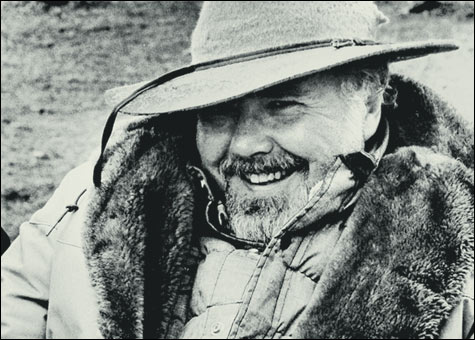
BIG DADDY: What was everything to Altman was moviemaking, both the art and the hanging-out. |
| Robert Altman: The Oral Biography | By Mitchell Zuckoff | Knopf | 576 pages | $35 |
You're a cocky film-school grad with a drawer full of socko screenplays and Hollywood ambitions. But it's all California dreamin', as you're shivering in New England, cutting public-service announcements and digitizing educational videos, your only brush with the studios those Netflix rentals.Is it all over? Take heart from the example of Robert Altman. Deep into his 30s, the future auteur of M*A*S*H, McCabe & Mrs. Miller, Nashville, and other essential movie classics was directing 16mm industrial films in his nowheresville home town of Kansas City, Missouri. He'd already tried LA, returning to KC dead broke and a flop.
Give up? Not Bob Altman. He believed too firmly in his innate talent. As we're shown in Robert Altman: The Oral Biography, a marvelous, behind-the-scenes book by BU journalism professor Mitchell Zuckoff, this brash former World War II bomber pilot didn't take no for an answer. Back home in Missouri, Altman learned his craft, helming almost a dozen commissioned shorts with titles like "How To Run a Filling Station." Eventually, Hollywood would find him.
Altman's odd way of making industrials in 1950s Kansas City proved a laboratory for how he'd do things later in TV and Hollywood. He cast friends and outsiders, he shot experimentally with overlapping dialogue, he drank heavily and smoked dope openly, and the shooting day continued with uninhibited parties, most often at his home.
He was Big Daddy, charming and embracing, and his actors, even in the Kansas City days, adored him. But woe to his bevy of wives: Altman was a mean alcoholic, a wild gambler, and a hearty womanizer. Until his old age, there was little remorse for lost fortunes, abandoned spouses, and his half-dozen screwed-up children, none of whom went to college. What was everything to Altman was moviemaking, both the art and the hanging out. His last wife standing, Kathryn, remained with him from 1959 to the end, and with her spirit, fortitude, humor, and astonishing forgiveness, she's kind of the hero of Zuckoff's book. Who else would have baked the pot brownies that she and Bob munched on from a paper bag live at the Oscars?
A thorough, trusty interviewer, Zuckoff marches through Altman's life (1925–2006) via salient quotes from family, ex-family, casts, and crews. With the advantage of Altman's blessing on the project before the filmmaker died, he had an in to practically everyone, from Altman regulars like Michael Murphy and Sally Kellerman to the impossibly hard-to-get Warren Beatty and Leonard Cohen. And to Altman himself: "This [M*A*S*H] is the first time that the word 'fuck' was used in an R-rated film."
Zuckoff confirms Altman's amazingly casual approach to casting, even for multi-million-dollar Hollywood pictures. Someone would walk into a room; Altman would be there in a bathrobe and he'd look at the actor for a moment and then say, "How would you like to be in such-and-such a film?" There'd be no major conversation, certainly no formal audition. Such Altman stalwarts as Keith Carradine and Shelley Duvall were found this way. Duvall wasn't even an actor, just a skinny, interesting-looking chick living in Houston, when Altman offered her the lead for Brewster McCloud.